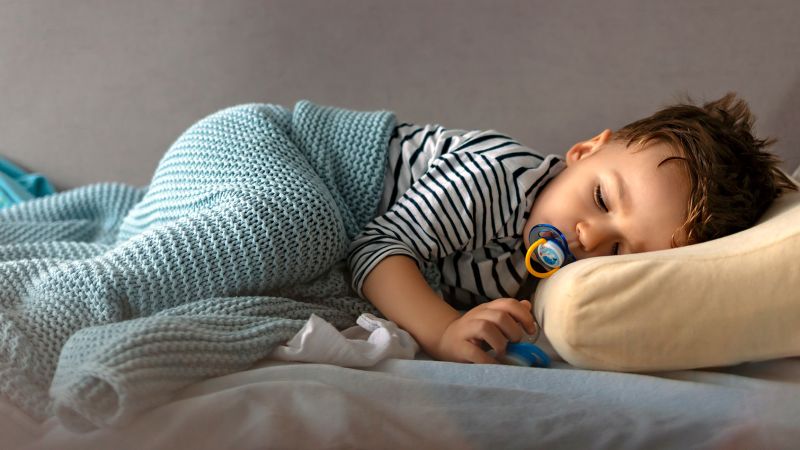The Right Time To Stop: Weaning Your Child Off Pacifiers And Thumb Sucking

Welcome to your ultimate source for breaking news, trending updates, and in-depth stories from around the world. Whether it's politics, technology, entertainment, sports, or lifestyle, we bring you real-time updates that keep you informed and ahead of the curve.
Our team works tirelessly to ensure you never miss a moment. From the latest developments in global events to the most talked-about topics on social media, our news platform is designed to deliver accurate and timely information, all in one place.
Stay in the know and join thousands of readers who trust us for reliable, up-to-date content. Explore our expertly curated articles and dive deeper into the stories that matter to you. Visit Best Website now and be part of the conversation. Don't miss out on the headlines that shape our world!
Table of Contents
The Right Time to Stop: Weaning Your Child Off Pacifiers and Thumb Sucking
For many parents, the pacifier and thumb become comforting companions for their little ones. These seemingly innocent habits, however, can lead to dental and speech issues if continued beyond a certain age. Knowing when and how to wean your child off pacifiers and thumb sucking is crucial for their healthy development. This article will guide you through the process, offering expert advice and practical tips.
Why Weaning Is Important
Prolonged pacifier or thumb sucking can lead to several problems, including:
- Dental Issues: Persistent sucking can cause misalignment of teeth, an overbite, or an open bite, potentially requiring orthodontic intervention later in life. This can impact chewing, speech, and even self-esteem.
- Speech Problems: Sucking habits can interfere with proper tongue placement and articulation, potentially leading to lisps or other speech impediments.
- Ear Infections: Pacifier use has been linked to an increased risk of middle ear infections in some studies.
- Psychological Dependence: While comforting, excessive reliance on a pacifier or thumb can hinder a child's ability to self-soothe and develop independent coping mechanisms.
When to Start Weaning
The American Academy of Pediatric Dentistry (AAPD) recommends weaning your child off pacifiers by age 3 and ceasing thumb sucking by age 4 or 5. However, the ideal timeframe depends on individual circumstances. Consider these factors:
- Child's Development: Is your child showing signs of readiness? Are they becoming more independent and less reliant on the pacifier or thumb for comfort?
- Dental Alignment: Have you noticed any changes in your child's bite or teeth alignment? Consult your pediatrician or dentist for professional assessment.
- Child's Emotional State: Avoid weaning during periods of significant stress or change, such as starting preschool or dealing with a sibling's birth.
Strategies for Successful Weaning:
Weaning a child isn't a one-size-fits-all approach. Patience and consistency are key. Here are some effective strategies:
- Gradual Reduction: Instead of abruptly taking away the pacifier or discouraging thumb sucking, gradually reduce its use. For example, you might limit it to naptime and bedtime only.
- Positive Reinforcement: Reward your child for positive behaviors. A sticker chart or small, age-appropriate reward can be incredibly motivating.
- Distraction Techniques: When your child reaches for their pacifier or thumb, try distracting them with an alternative activity, like a favorite toy or game.
- Open Communication: Talk to your child about weaning. Explain why it's important and reassure them that you'll be there to support them.
- Professional Help: If you're struggling, consider seeking guidance from your pediatrician or a child psychologist.
Dealing with Resistance:
Expect some resistance. Weaning can be challenging for both parents and children. Stay consistent, remain supportive, and celebrate small victories along the way. It's okay to have setbacks; just gently redirect your child and continue with your chosen strategy.
Maintaining Oral Hygiene:
Regardless of pacifier or thumb use, maintaining good oral hygiene is crucial. Start brushing your child's teeth as soon as the first tooth erupts, using a soft-bristled brush and fluoride toothpaste.
Conclusion:
Weaning your child off pacifiers and thumb sucking is an important step in their development. By following these guidelines and remaining patient, you can successfully guide your child towards healthier oral habits and greater independence. Remember to consult your pediatrician or dentist if you have any concerns. Early intervention can prevent more significant dental problems down the line. Learning to self-soothe is a valuable life skill, and supporting your child through this transition will contribute to their overall well-being.

Thank you for visiting our website, your trusted source for the latest updates and in-depth coverage on The Right Time To Stop: Weaning Your Child Off Pacifiers And Thumb Sucking. We're committed to keeping you informed with timely and accurate information to meet your curiosity and needs.
If you have any questions, suggestions, or feedback, we'd love to hear from you. Your insights are valuable to us and help us improve to serve you better. Feel free to reach out through our contact page.
Don't forget to bookmark our website and check back regularly for the latest headlines and trending topics. See you next time, and thank you for being part of our growing community!
Featured Posts
-
 See Daniel Craig Cillian Murphy And Tom Hardy In This Powerful Wwi Drama
May 20, 2025
See Daniel Craig Cillian Murphy And Tom Hardy In This Powerful Wwi Drama
May 20, 2025 -
 President Bidens Health Update Prostate Cancer Diagnosis And Next Steps
May 20, 2025
President Bidens Health Update Prostate Cancer Diagnosis And Next Steps
May 20, 2025 -
 International Support Urged For Balis Tourist Safety And Behavior Initiatives
May 20, 2025
International Support Urged For Balis Tourist Safety And Behavior Initiatives
May 20, 2025 -
 Urgent Security Alert Legal Aid Suffers Data Breach Exposing Criminal Records And Personal Data
May 20, 2025
Urgent Security Alert Legal Aid Suffers Data Breach Exposing Criminal Records And Personal Data
May 20, 2025 -
 Jamie Lee Curtis Discusses Her Bond With Lindsay Lohan A Heartfelt Interview
May 20, 2025
Jamie Lee Curtis Discusses Her Bond With Lindsay Lohan A Heartfelt Interview
May 20, 2025
Latest Posts
-
 Brett Favre Sexting Scandal Jenn Sterger Recounts Her Experience And Its Aftermath
May 20, 2025
Brett Favre Sexting Scandal Jenn Sterger Recounts Her Experience And Its Aftermath
May 20, 2025 -
 New Wwi Movie Featuring Daniel Craig Cillian Murphy And Tom Hardy Streaming Now
May 20, 2025
New Wwi Movie Featuring Daniel Craig Cillian Murphy And Tom Hardy Streaming Now
May 20, 2025 -
 Peaky Blinders Creator Announces New Series Detailing Key Departure
May 20, 2025
Peaky Blinders Creator Announces New Series Detailing Key Departure
May 20, 2025 -
 Controversy Erupts Jon Jones And The Ufcs Handling Of Aspinall Injury
May 20, 2025
Controversy Erupts Jon Jones And The Ufcs Handling Of Aspinall Injury
May 20, 2025 -
 Post Pectra Upgrade Investors Inject 200 Million Into Ethereum Funds
May 20, 2025
Post Pectra Upgrade Investors Inject 200 Million Into Ethereum Funds
May 20, 2025
